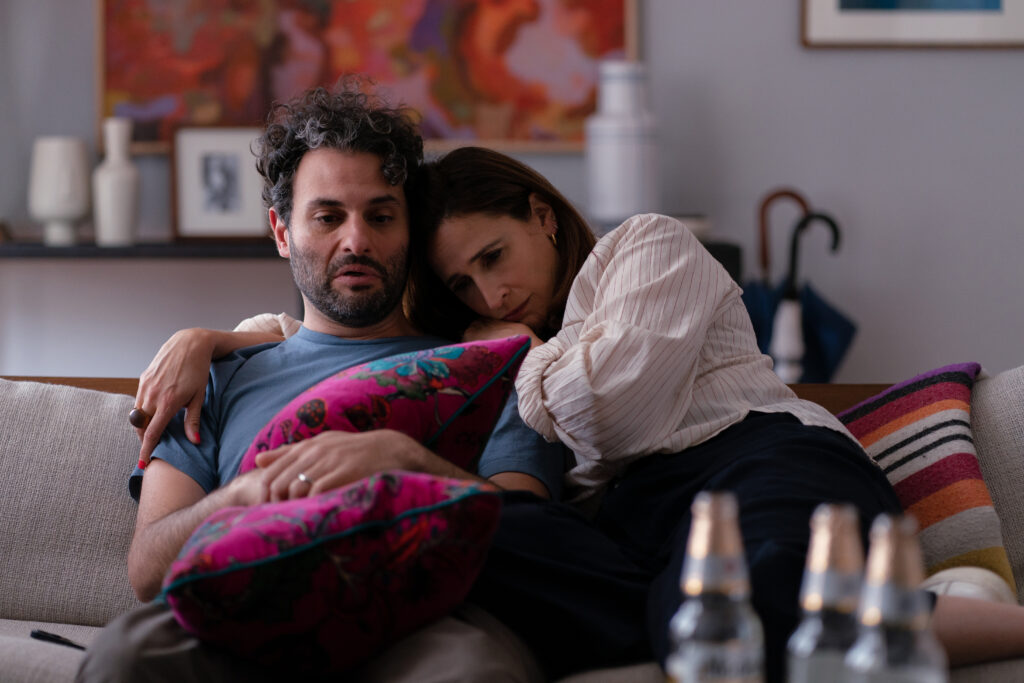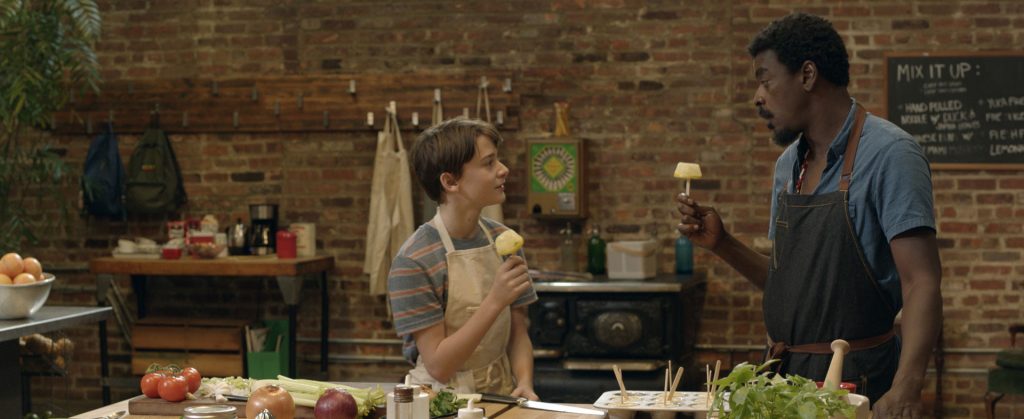May 27, 2023
by Carla Hay

Directed by Nicole Holofcener
Culture Representation: Taking place in New York City, the comedy film “You Hurt My Feelings” features a predominantly white cast of characters (with some African Americans and Asians) representing the working-class and middle-class.
Culture Clash: An insecure book author gets deeply upset when she finds out that her psychotherapist husband has been pretending to like her first novel, and this revelation leads her to question his honesty in the marriage.
Culture Audience: “You Hurt My Feelings” will appeal primarily to people who are fans of Julia Louis-Dreyfus, filmmaker Nicole Holofcener and satire-tinged comedies where people make a big deal out of problems that are very trivial in the real world.

If you’re a fan of comedies that poke gentle fun at somewhat spoiled protagonists, then “You Hurt My Feelings” (written and directed by Nicole Holofcener) is the type of movie that perfectly fits this description. It’s a low-key and realistic comedy about people who live in the bubble of being privileged and neurotic New Yorkers. Julia Louis-Dreyfus is an actress queen for this type of character. This movie isn’t for everyone, but the performances are entertaining. “You Hurt My Feelings” had its world premiere at the 2023 Sundance Film Festival.
In “You Hurt My Feelings” (which takes place in New York City), Louis-Dreyfus portrays Beth Mitchell, an insecure book author who is constantly seeking validation from people around her. The person whose opinions and respect that Beth values the most is her husband Don Mitchell (played by Tobias Menzies), who is an easygoing psychotherapist. Don is very laid-back and tolerant, while Beth is uptight and judgmental. Even though Beth and Don have opposite personalities, they’ve had a very long and happy marriage.
At least that’s what Beth thinks, until she finds out something that shakes her to the core: Don has been pretending to like the book that Beth is currently working on: her first novel, which is also her second book. Don is one of the few people whom Beth has let read the manuscript for this novel. She’s already feeling insecure because her first book (a memoir detailing the verbal abuse she got from her now-deceased father) was not the bestseller that Beth hoped it would be. The memoir wasn’t a total flop, but it had sales that were lukewarm.
Adding to Beth’s unease about her first novel is the less-than-enthusiastic response from her book agent. Not long before Beth found out that Don doesn’t like the manuscript, her agent Sylvia (played by LaTanya Richardson Jackson) told Beth during a lunch meeting that Sylvia doesn’t really like the manuscript either and thinks it’s not as interesting as Beth’s memoir. Sylvia commented to Beth in this meeting that there’s a lot of competition in the book publishing industry, which is always looking for “new voices.” Beth interprets this comment as Sylvia telling Beth that she’s old.
Why is Beth so insecure? It’s mentioned about midway through the movie that her father did a lot of emotional damage to her with his verbal abuse. He often called her “shit for brains” when Beth was a child. It’s a phrase that Beth says out loud to herself when she’s having moments of very low self-esteem.
Beth’s world is fairly insular, since most of the people she interacts with are family members and work colleagues. She teaches a creative writing class to people who are mostly in their 20s and 30s. Beth encourages her students to take risks in their work. It’s advice that Beth doesn’t always follow for herself. The movie later shows how Beth can be hypocritical in other ways.
Beth has a younger sister named Sarah (played Michaela Watkins), an interior designer who’s battling her own insecurities about her career. Sarah is married to a frequently unemployed actor named Mark (played by Arian Moayed), who’s frustrated that he hasn’t been able to land starring roles and get work more often. Mark also happens to be Don’s best friend. (People from Don’s side of the family are never mentioned in the movie.) Beth and Sarah have a cranky and forgetful mother named Georgia (played by Jeannie Berlin), who might be showing signs of early onset dementia.
Don and Beth’s only child is a 23-year-old son named Eliot (played by Owen Teague), who works at a marijuana dispensary. Even though Beth occasionally smokes marijuana, she tells Eliot that she’s uncomfortable with his job, because she thinks there’s potential for danger on the job, and she thinks that college graduate Eliot (who is an aspiring playwright) isn’t living up to his potential. Beth thinks it’s also why Eliot’s girlfriend Alison (who’s never seen in the movie), an aspiring lawyer, seems to be drifting away from Eliot.
“You Hurt My Feelings” is made like a compilation of scenarios that show different personal angles of Beth and her loved ones. Beth finds out about Don’s true feelings for her manuscript when she and Sarah spontaneously eavesdrop on Don and Mark in a sporting goods store. The way that Beth reacts is as if Don betrayed her in the most hurtful manner possible. Beth begins to wonder if she even she even knows Don at all.
The movie goes back and forth between showing Beth’s interactions with people, as well as the therapy sessions that Don (a doctor with his own practice) has with some of his clients. These therapy sessions seem to be in the movie to show how Don approaches problem-solving in his clients’ personal relationships, compared to problem-solving in his own personal relationships.
The movie’s opening scene shows Don in a therapy session with a bickering married couple named Jonathan (played by David Cross) and Carolyn (played by Amber Tamblyn), who say hateful things to each other. (Cross and Tamblyn are spouses in real life.) Don passively sits and listens, even though Jonathan and Carolyn clearly want the type of therapist who will give them advice on what to do about their marriage. And as time goes on, viewers see that Don’s non-confrontational style can be a detriment in his own marriage.
An early scene in “You Hate My Feelings” shows a wedding anniversary dinner that Beth and Don are having together at a restaurant. Don gives Beth a pair of gold leaf earrings as his anniversary gift. Beth gives Don a black V-necked shirt. They both smile and seem happy with these gifts during this romantic dinner. Later in the movie, it’s shown that these gifts are symbols of much deeper issues in Beth and Don’s relationship.
Louis-Dreyfus is the obvious standout in a movie where her Beth character is the main focus of the story. However, Watkins and Berlin also give terrific performances that skillfully balance realism with talented comedic timing. Menzies plays his part well as a somewhat bland but loyal husband, while the other cast members are part of the overall believability in their roles, which could easily have been played as caricatures.
Of course, many viewers won’t feel too sorry for Beth, because she has the type of comfortable life that many people would like to have: She’s healthy. She’s surrounded by people who love her. And she doesn’t have to worry about basic needs, such as food or shelter.
But truth be told, a lot of privileged people who have charmed existences in real life can’t see beyond their own trivial problems because they really have no reason or motivation to do so. The closest that Beth wants to acknowledge any type of “real world” suffering is volunteering with Sarah at a charity that gives away free clothes to underprivileged people. If Beth’s worst problem is finding out that her husband doesn’t like her latest book, then that’s a pretty good life to have.
The movie admits it at one point when Don comments to Beth about how she’s reacting to him not liking her novel: “The whole world is falling apart, and this is what consumes you?” Beth replies, “I know the whole world is falling apart … but this is my small, narcissistic world, and I’m hurt.” For all the neuroses and self-absorption on display, a movie like “You Hurt My Feelings” serves as a reminder that people who seem to “have it all” can still find reasons to be miserable if they’re not completely happy with themselves.
A24 released “You Hurt My Feelings” in U.S. cinemas on May 26, 2023.


